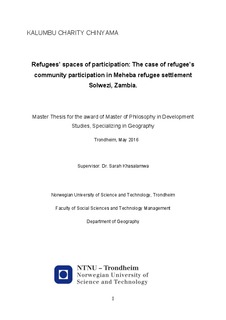| dc.description.abstract | This study aims at understanding what constitutes participation of refugees in their communities of settlement. It attempts to get a clear picture of the spaces formed, their purposes and the meaning refugees attach to participation. The study was conducted in Meheba, Zambia. Being the largest, earliest camp and hosting a large number of refugees living in protracted situation, Meheba offered the best site for the study of lived realities tracked in a period of more than ten years to date.
The study was theoretically pinned to the discourse of alternative development, concepts such as knowledge, agency, social capital and power were also made operational in the interpretation of the empirical data. Following a qualitative research methodology, empirical data was collected from a total sample of 29 informants comprising of 19 primary informants (refugees) and 10 key informants on the topic. The data collected was through interviews, field notes, informal dialogues, focus group discussions as well as observations.
This study revealed that participation is practiced differently by institutions and humanitarian organizations, mostly it is in line with their mandates. The major challenge is that this mismatch of practices is never understood by refugees. Refugees anticipates practices that nurture their voices all the way from planning to implementation, however this is far impossible in some agencies as the many participatory spaces formed are mere consultation and informing platforms. This problem results in a loss of confidence and trust in spaces formed especially the invited spaces of institutions.
The study therefore concludes that for participation to be appreciated and trusted, organisations need to have one global working definition of participation adopted so that their practices are not deviant from each other. Humanitarian organisations need to operate from the grassroots level and the decisions enacted ought to be decentralised in a manner that they are driven by the victims at stake. Adopted working customs of state ministries ought to be revisited in a way that power is evenly distributed and not too much vested in one official. Refugees themselves also need to stand firm to community cohesion for positive sustainable outcomes. | nb_NO |
